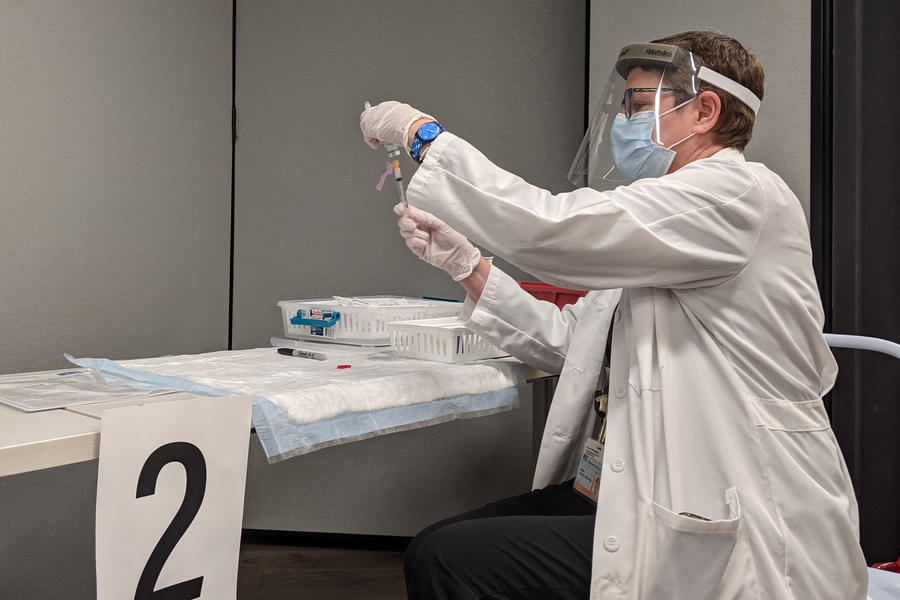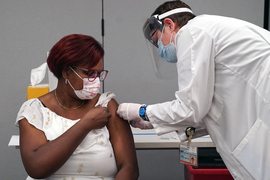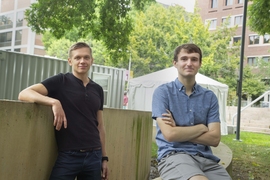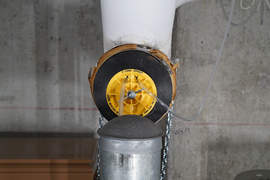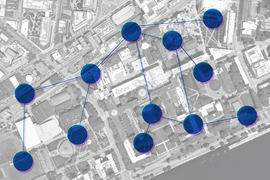The Commonwealth of Massachusetts has approved MIT’s request to serve as an employer-based distributor of the Covid-19 vaccine.
The designation means that as sufficient doses of the vaccine become available over the coming months, the Institute will be in a position to vaccinate some 50,000 MIT students, employees, affiliates, and their dependents — regardless of whether MIT Medical is their primary care provider.
MIT brings to this effort its long track record running one of the largest flu vaccination clinics in New England, as well as its recent experience administering regular Covid-19 tests to thousands of members of the MIT community. This expertise will allow MIT Medical to help relieve pressure on local hospitals, health systems, medical offices, and other entities that are expected to play a leading role in vaccinating millions of residents of the Boston area.
“All of us are craving the ordinary, wonderful sense of human connection,” President L. Rafael Reif says. “Imagine the wonderful day when you can stop wearing a mask, or see other people’s smiles, or go to a concert, or watch your favorite team play in person, or gather with friends and family at a favorite restaurant for a celebratory meal. We are on the path to that day — provided that we all take the steps necessary to keep ourselves, our families, our communities, and our nation healthy and safe. One vital step on the path is vaccination. So I am extremely pleased that the state has granted MIT this status.”
MIT is one of several area universities to receive state approval to vaccinate its own campus community. This designation does not preclude members of the MIT community from seeking vaccinations elsewhere; indeed, MIT Medical continues to urge members of the community who can more quickly obtain a Covid-19 vaccine elsewhere to do so. Individuals who receive the vaccine in the near term will need to continue wearing masks and engaging in social distancing until enough citizens have been vaccinated to arrest the community spread of Covid-19.
“The speed of this vaccine’s development was due to the sharing of research on a scale never attempted before — with every study and every phase of every trial carefully reviewed by a safety board and the FDA,” says Cecilia Stuopis, medical director of MIT Medical. “The process was transparent and rigorous throughout, with continual oversight and expert approval.”
Phases of the vaccine roll-out
MIT Medical has already offered vaccinations to all Institute employees who qualified under Phase 1 of the framework established by the Commonwealth of Massachusetts. Under Phase 1, MIT Medical administered the vaccine to roughly 700 individuals categorized by Massachusetts as top-priority recipients. Those recipients, vaccinated starting Dec. 28, included frontline, public-facing, or essential employees of MIT Medical, MIT Police, and MIT EMS, as well as Broad Institute employees involved in processing Covid-19 tests for MIT and scores of other institutions across New England.
Starting on Monday, Feb. 1, Massachusetts enters Phase 2 of the vaccine rollout plan. Looking ahead to the much broader vaccinations that will occur once Massachusetts enters Phase 3 (expected in April and beyond), the Institute has established a Vaccine Planning Team (VPT). Chaired by Vice Chancellor Ian Waitz, the VPT includes representatives from MIT Medical, MIT Emergency Management, MIT Human Resources, and from the offices of the Provost, General Counsel, Vice President for Research, and Vice President for Communications.
This group will make recommendations on priorities and protocols to guide MIT’s approach to vaccinating the many members of the MIT community who will be eligible under the state’s rollout guidelines. These recommendations will be sent for decisions to MIT’s Covid Decision Team, a group of senior Institute leaders established last year to guide MIT’s actions in response to Covid-19, and to President Reif.
MIT will share more information in the coming weeks on how it will prioritize and manage Covid-19 vaccinations within its community.
What happens next
To help make the most efficient use of any vaccine received by MIT Medical, next week the Institute will send all members of our community a link to preregister for the vaccine. This electronic form will allow individuals (including current employees, current students, and those in Covid Pass with current access to campus) to indicate whether they want to get the vaccine at MIT; provide basic demographic information needed to match them to the state’s rollout groups; and indicate their readiness to receive the vaccine once their group is eligible, including if they want to be on a standby list. Individuals may input the same information for household family members and dependents who may wish to get the vaccine at MIT.
Responses to the form are nonbinding, meaning they may be updated later. This information will be kept private — not shared beyond those who need it for operational purposes — and will help MIT Medical most efficiently allocate its limited doses of the vaccine, which must be used within hours of a vial being opened.
In the coming days, additional details on this prevaccination registration process will come in an email to all members of the community.
MIT’s stance on the Covid-19 vaccine
MIT does not currently expect to require that any members of our community receive a Covid-19 vaccine — but the leaders of the Institute and MIT Medical are encouraging vaccination in the strongest possible terms. These campus leaders, as well as the nation’s top medical experts, believe that the vaccine represents the best way for individuals to keep themselves, their families, and their communities safe from Covid-19.
“I plan to be vaccinated as soon I can, and I am urging everyone at MIT and well beyond to get themselves vaccinated at their first opportunity,” says Institute Professor and Nobel laureate Phillip Sharp, whose pioneering research in the 1970s helped pave the way for today’s generation of mRNA vaccines. “These vaccines have been shown to reduce the risk of infection and the severity of infection. They have been produced in record time, some by local biotechnology firms with strong connections to MIT, and they are triumphs of biomedical research. Getting vaccinated is a simple step to protect yourself, and if we all do it, it will make it possible to get back to the way of life we miss so much — to work side-by-side with colleagues and students, to hug our friends, and more.”
Elazer Edelman, the Edward J. Poitras Professor in Medical Engineering and Science, director of MIT’s Institute for Medical Engineering and Science, and a practicing cardiologist at Brigham and Women’s Hospital, adds: “Our MIT community is unlike any other. Our friends and colleagues are on the front lines of providing medical care, devising new strategies for treating those who are stricken, and protecting the world around us. The world has been waiting for a vaccine for almost a year, understanding that it is only through global immunization that we can provide universal protection. Now that MIT and others have contributed to making vaccination a reality, we all have an obligation to use it as soon as possible. In this way, we simultaneously honor health care providers, scientists, and our community.”
